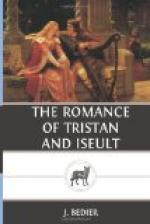At midnight, when all was dark in the room, no candle nor any lamp glimmering, the King went out silently by the door and with him the dwarf. Then Tristan rose in the darkness and judged the spear length and leapt the space between, for his farewell. But that day in the hunt a boar had wounded him in the leg, and in this effort the wound bled. He did not feel it or see it in the darkness, but the blood dripped upon the couches and the flour strewn between; and outside in the moonlight the dwarf read the heavens and knew what had been done and he cried:
“Enter, my King, and if you do not hold them, hang me high.”
Then the King and the dwarf and the four felons ran in with lights and noise, and though Tristan had regained his place there was the blood for witness, and though Iseult feigned sleep, and Perinis too, who lay at Tristan’s feet, yet there was the blood for witness. And the King looked in silence at the blood where it lay upon the bed and the boards and trampled into the flour.
And the four barons held Tristan down upon his bed and mocked the Queen also, promising her full justice; and they bared and showed the wound whence the blood flowed.
Then the King said:
“Tristan, now nothing longer holds. To-morrow you shall die.”
And Tristan answered:
“Have mercy, Lord, in the name of God that suffered the Cross!”
But the felons called on the King to take vengeance, saying:
“Do justice, King: take vengeance.”
And Tristan went on, “Have mercy, not on me—for why should I stand at dying?—Truly, but for you, I would have sold my honour high to cowards who, under your peace, have put hands on my body—but in homage to you I have yielded and you may do with me what you will. But, lord, remember the Queen!”
And as he knelt at the King’s feet he still complained:
“Remember the Queen; for if any man of your household make so bold as to maintain the lie that I loved her unlawfully I will stand up armed to him in a ring. Sire, in the name of God the Lord, have mercy on her.”
Then the barons bound him with ropes, and the Queen also. But had Tristan known that trial by combat was to be denied him, certainly he would not have suffered it.
For he trusted in God and knew no man dared draw sword against him in the lists. And truly he did well to trust in God, for though the felons mocked him when he said he had loved loyally, yet I call you to witness, my lords who read this, and who know of the philtre drunk upon the high seas, and who, understand whether his love were disloyalty indeed. For men see this and that outward thing, but God alone the heart, and in the heart alone is crime and the sole final judge is God. Therefore did He lay down the law that a man accused might uphold his cause by battle, and God himself fights for the innocent in such a combat.
Therefore did Tristan claim justice and the right of battle and therefore was he careful to fail in nothing of the homage he owed King Mark, his lord.




